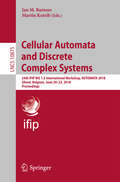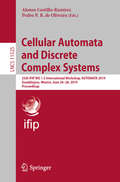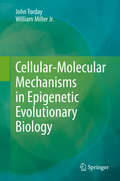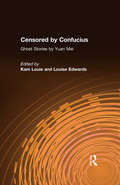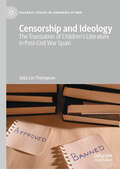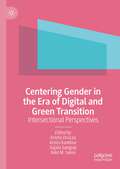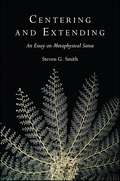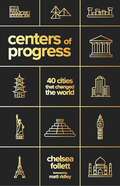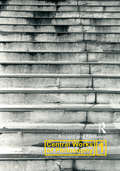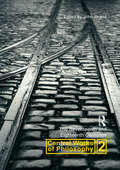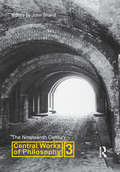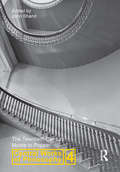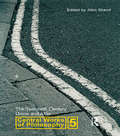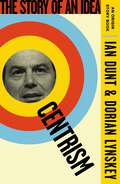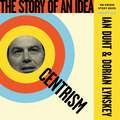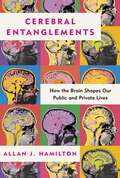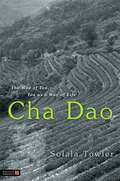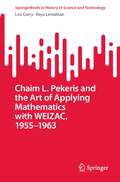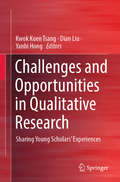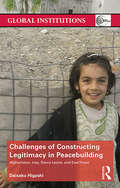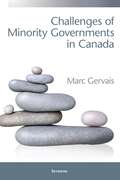- Table View
- List View
Cellular Automata and Discrete Complex Systems: 24th IFIP WG 1.5 International Workshop, AUTOMATA 2018, Ghent, Belgium, June 20–22, 2018, Proceedings (Lecture Notes in Computer Science #10875)
by Jan M. Baetens Martin KutribThis volume constitutes the thoroughly refereed proceedings of the 24th IFIP WG 1.5 International Workshop on Cellular Automata and Discrete Complex Systems, AUTOMATA 2018, held in Ghent, Belgium, in June 2018.The 10 regular papers presented in this book were carefully reviewed and selected from a total of 16 submissions. The papers highlight the major advances in the field and the development of new tools, support the development of theory and applications of CA and DCS and identify and study within an inter- and multidisciplinary context, the important fundamental aspects, concepts, notions and problems concerning CA and DCS.
Cellular Automata and Discrete Complex Systems: 25th IFIP WG 1.5 International Workshop, AUTOMATA 2019, Guadalajara, Mexico, June 26–28, 2019, Proceedings (Lecture Notes in Computer Science #11525)
by Alonso Castillo-Ramirez Pedro P. B. de OliveiraThis volume constitutes the refereed proceedings of the 25th IFIP WG 1.5 International Workshop on Cellular Automata and Discrete Complex Systems, AUTOMATA 2019, held in Guadalajara, Mexico, in June 2019.The 7 regular papers presented in this book were carefully reviewed and selected from a total of 10 submissions. The topics of the conference include deal with dynamical, topological, ergodic and algebraic aspects of CA and DCS, algorithmic and complexity issues, emergent properties, formal languages, symbolic dynamics, tilings, models of parallelism and distributed systems, timing schemes, synchronous versus asynchronous models, phenomenological descriptions, scientic modeling, and practical applications.
Cellular-Molecular Mechanisms in Epigenetic Evolutionary Biology
by John Torday William Miller Jr.There has been no mechanistic explanation for evolutionary change consistent with phylogeny in the 150 years since the publication of ‘Origins’. As a result, progress in the field of evolutionary biology has stagnated, relying on descriptive observations and genetic associations rather testable scientific measures. This book illuminates the need for a larger evolutionary-based platform for biology. Like physics and chemistry, biology needs a central theory in order to frame the questions that arise, the way hypotheses are tested, and how to interpret the data in the context of a continuum.The reduction of biology to its self-referential, self-organized properties provides the opportunity to recognize the continuum from the Singularity/Big Bang to Consciousness based on cell-cell communication for homeostasis.
Censored by Confucius: Ghost Stories by Yuan Mei
by Kam Louie Louise Edwards Yuan Mei"The one hundred-some stories depict the important role ghosts played in the lives of the Chinese, as well as revealing a great deal about sex, revenge, transvestism, corruption, and other topics banned by Mei's puritanical mid-Qing society". -- Reference & Research Book News.
Censorship and Ideology: The Translation of Children's Literature in Post-Civil War Spain (Palgrave Studies in Languages at War)
by Julia Lin ThompsonThis book offers a fascinating picture of how state censorship affected children’s literature translation in post-Civil War Spain. Focusing on the Spanish translations of Mark Twain’s children’s classics The Adventures of Tom Sawyer and The Adventures of Huckleberry Finn, the author traces the evolution of the censorship system of the Francoist regime and its impact on Spanish children’s literature during the years after the Spanish Civil War. Drawing on the regime’s censorship laws, official censors’ records, and textbooks, she not only examines the censorship imposed on the translations of Twain’s works, but also offers insights into the intricate connections between state censorship and the regime’s educational aims. The book gives a revealing analysis of the ways in which the highly bureaucratic censorship apparatus operated under Franco’s dictatorship, outlining the flaws and fallacies within it, as well as the strategies adopted by publishers and translators to resist the power of the state. While centred on Francoist Spain, the book also explores broader themes of ideology, censorship, and translation, making it a valuable source for scholars of translation studies and Hispanic studies, as well as those with a wider interest in literature, history, and cultural studies.
Centering Gender in the Era of Digital and Green Transition: Intersectional Perspectives
by Adel M. Sarea Amira Kaddour Kristie Drucza Sujata GangulyThis edited volume examines the importance of centering gender in research and policymaking focused on climate change, environmental sustainability, and digital technology. Chapters unpack how the transition to a green and digital future affects various fields and industry sectors including STEM, agriculture, and energy, as well as why gender-transformative approaches—particularly the production and analysis of gender-inclusive disaggregated data—should be included in those transitions. The editors and authors also look at the positive impact of these considerations on economic growth and poverty eradication. Finally, this book presents an ideal/utopian view of what a gender-equal and inclusive world that has transitioned to green industries and embraced digital technologies might look like.This book will be of interest to scholars, researchers, students and policymakers across the Social Sciences including Sociology, Anthropology, Gender Studies, Science & Technology Studies, and Economics.
Centering and Extending: An Essay on Metaphysical Sense
by Steven G. SmithIn Centering and Extending, Steven G. Smith retrieves and refashions some of the best ideas of classical and early modern metaphysics to support insight into the natures of mental and material beings and their relations. Avoiding what he critiques as distortive paths of idealism, materialism, repressive monism, and overly permissive pluralism, Smith builds his framework on centering and extending as universal principles of formation. Identifying the basic consistency of being with these principles in symmetrical partnership enables a naturalist process view that, unlike Whitehead's, does not overbalance toward the subjective and teleological and, unlike Deleuze and Guattari's, does not overbalance toward the material and chaotic. This view supports useful conceptions of mind and matter, form and energy, reason and cause, and a layered world order without relying on a blind concept of supervenience or emergence. It also respects and reinforces a division of roles between metaphysical sense-making and spiritual determinations of meaningfulness.
Centers of Progress: Forty Cities that Changed the World
by Chelsea FollettWhere does progress happen? The story of civilization is the story of the city. It is cities that have created and defined the modern world by acting as the sites of pivotal advances in culture, politics, science, technology, and more. There is no question that certain places, at certain times in history, have contributed disproportionately toward making the world a better place. This book tells the story of 40 of those places. <p><p>In Centers of Progress: 40 Cities That Changed the World, Chelsea Follett examines a diverse group of cities, ranging from ancient Athens to Song-era Hangzhou. But some common themes stand out: most cities reach their creative peak during periods of peace; most centers of progress also thrive during times of social, intellectual, and economic freedom, as well as openness to intercultural exchange and trade; and centers of progress tend to be highly populated. Because, in every city, it is ultimately the people who live there who drive progress forward―if given the freedom to do so. <p><p>Identifying common factors―such as relative peace, freedom, and multitudes―among the places that have produced history's greatest achievements is one way to learn what causes progress. Change is a constant, but progress is not. Understanding what makes a place fertile ground for progress may help to sow the seeds of future innovations. <p><p>Moreover, their story is our story. City air provides the wind in the sails of the modern world. Come journey through these pages to some of history's greatest centers of progress.
Central Bank Independence and Transparency: Evolution and Effectiveness
by Christopher Crowe Ellen E. MeadeA report from the International Monetary Fund.
Central Works of Philosophy v1: Ancient and Medieval (Central Works Of Philosophy Ser. #5)
by John ShandThis collection of essays showcases the most important and influential philosophical works of the ancient and medieval period, roughly from 600 BC to AD 1600. Each chapter takes a particular work of philosophy and discusses its proponent, its content and central arguments. These are: Plato's Republic; Aristotle' Nichomachean Ethics; Lucretius' On the Nature of the Universe; Sextus Emperiicus' Outlines of Pyrrhonism; Plotinus' The Enneads; Augustine's City of God; Anselm's Proslogion; Aquinas' Summa Theologia; Duns Scotus' Ordinatio; William of Ockham's Summa Logicae .
Central Works of Philosophy v2: Seventeenth and Eighteenth Centuries (Central Works Of Philosophy Ser. #5)
by John ShandCentral Works of Philosophy is a major multi-volume collection of essays on the core texts of the Western philosophical tradition. From Plato's Republic to Quine's Word and Object, the five volumes range over 2,500 years of philosophical writing covering the best, most representative, and most influential work of some of our greatest philosophers, each of them primary texts studied at undergraduate level. Each essay has been specially commissioned and provides an overview of the work, clear and authoritative exposition of its central ideas, and an assessment of the work's importance then and now. Each essay equips the reader with the resources and confidence to go on to read the works themselves. Together these books provide an unrivaled companion for studying and reading philosophy, one that introduces the reader to the masterpleces of the western philosophical canon and some of the greatest minds that have ever lived talking about the profoundest most exciting problems there are. The seventeenth and eighteenth centuries saw a brilliant outpouring of philosophical thought unprecedented in human history. Together philosophy and science pushed medieval and Renaissance scholasticism aside to lay the foundations of the modern world. Beginning with Descartes' Meditations, the contributors examine some of the period's most seminal philosophical texts: Spinoza's Ethics, which presents a complete picture of reality that has at its heart how we can be good, the Monadology, in which Leibniz describes what must underpin reality if it is to be fully explained, Hobbes' Leviathan, which reminds us of the dangers of the unchecked brutality of humanity; Rousseau's Social Contract, a vision of how human nature can be changed for the better in a new society, Locke's Essay Concerning Human Understanding which wishes us to grasp that we must make knowledge our own through experience not authority, Berkeley's attack on materialism in his Treatise and Hume's search for rational justification for our most basic beliefs about the world in his Treatise of Human Nature. Together these essays offer students a remarkable survey of the key texts and core ideas that make up the age of rationalism and empiricism.
Central Works of Philosophy v3: Nineteenth Century (Central Works Of Philosophy Ser. #5)
by John ShandCentral Works of Philosophy is a major multi-volume collection of essays on the core texts of the Western philosophical tradition. From Plato's Republic to the present day, the five volumes range over 2,500 years of philosophical writing covering the best, most representative, and most influential work of some of our greatest philosophers. Each essay has been specially commissioned and provides an overview of the work, clear and authoritative exposition of its central ideas, and an assessment of the work's importance. Together these books provide an unrivaled companion for studying and reading philosophy, one that introduces the reader to the masterpieces of the western philosophical canon. Much of nineteenth-century philosophy may be viewed as either an affirmation or rejection of Kant. This volume therefore begins with Kant's magnum opus, the Critique of Pure Reason. Michelle Grier provides a masterly distillation of this monumental work. Curtis Bowman explores the central text of the first of the great post-Kantian idealists, Fichte who extended Kantian philosophy in a new direction. Hegel, one of Kant's most formidable critics, is given incisive treatment by Michael Inwood in his presentation of the Phenomenology of Spirit. Schopenhauer's World as Will and Representation, which hoped to solve many of the problems that Kant's philosophy left unsolved is explored in Dale Jacquette's chapter. The moral philosophy of John Stuart Mill, perhaps the only philosopher in this volume to circumvent Kant's influence, is examined in Jonathan Riley's essay on his classic work On Liberty. The philosophical ideas of Kierkegaard, widely credited as the founder of modern existentialism, are explored by Stephen Evans in his essay on Philosophical Fragments. Marx's Capital, one of the most influential books of the modern age, is given expert treatment by Tom Rockmore. The volume closes with Nietzsche, whose appropriation of Kant led to a radical anti-philosophy. Rex Welshon dissects his most philosophical and widely read work, On the Genealogy of Morals.
Central Works of Philosophy v4: Twentieth Century: Moore to Popper
by John Shand"Central Works of Philosophy" is a major multi-volume collection of essays on the core texts of the Western philosophical tradition. From Plato's "Republic" to the present day, the five volumes range over 2,500 years of philosophical writing covering the best, most representative, and most influential work of some of our greatest philosophers. Each essay has been specially commissioned and provides an overview of the work, clear and authoritative exposition of its central ideas, and an assessment of the work's importance. Together these books provide an unrivaled companion for studying and reading philosophy, one that introduces the reader to the masterpieces of the western philosophical canon. The period, 1900-60, which this volume covers, witnessed changes in logical and linguistic analysis far beyond anything dreamt of in the previous history of the subject. The volume begins with chapters on the key texts of the Cambridge philosophers, Moore, Russell and Wittgenstein, which together marked the emergence of analytical philosophy. The Vienna Circle of the 1920s, and the development of logical positivism in the 1930s and 1940s are represented by chapters on two fundamental works by Carnap and Ayer. William James' "Pragmatism," which formulated pragmatism's epistemology and made it known throughout the world represents in the volume the distinctive ideas of the American pragmatists. Essays on Husserl's "The Idea of Phenomenology," Heidegger's "Being and Time," Sartre's "Being and Nothingness" and Merleau-Ponty's "Phenomenology of Perception" cover the core texts of the hugely significant phenomenological movement. Of the linguistic philosophy that dominated the English-speaking world in the immediate postwar years, Wittgenstein's "Philosophical Investigations" and Ryle's "The Concept of the Mind" are discussed in turn. The volume concludes with Karl Popper's influential account of the nature of science. Volume 4 covers the key works of philosophy written in the period 1900-60, which witnessed developments in logical and linguistic analysis far beyond anything dreamt of in the previous history of the subject. The volume includes chapters on central works by the Cambridge philosophers Moore, Russell and Wittgenstein, which together contributed to the emergence of analytic philosophy. The ideas of the Vienna Circle of the 1920s, and the logical positivism of the 1930s and 1940s are explored in chapters dealing with the works of Carnap and Ayer, and the distinctive ideas of the American pragmatists are discussed in a chapter on William James' Pragmatism, which propagated pragmatism by presenting its central tenets in a clear and accessible form. Essays on Husserl's "The Idea of Phenomenology," Heidegger's "Being and Time," Sartre's "Being and Nothingness" and Merleau-Ponty's "Phenomenology of Perception" cover the core texts of the continental European traditions of phenomenology and existentialism. Of the linguistic philosophy that dominated the English-speaking world in the immediate postwar years, Wittgenstein's "Philosophical Investigations" and Ryle's "The Concept of Mind" are discussed in turn. The volume concludes with a chapter on Karl Popper's influential account of the nature of scientific method in his seminal work, "The Logic of Scientific Discovery."
Central Works of Philosophy v5: Twentieth Century: Quine and After (Central Works Of Philosophy Ser. #Vol. 5)
by John ShandCentral Works of Philosophy is a major multi-volume collection of essays on the core texts of the Western philosophical tradition. From Plato's Republic to the present day, the five volumes range over 2,500 years of philosophical writing covering the best, most representative, and most influential work of some of our greatest philosophers. Each essay has been specially commissioned and provides an overview of the work, clear and authoritative exposition of its central ideas, and an assessment of the work's importance. Together these books provide an unrivaled companion for studying and reading philosophy, one that introduces the reader to the masterpieces of the western philosophical canon. This volume covers the central texts in the history of analytic philosophy from Quine's Word and Object (1960) to the present day. The texts range over political philosophy, ethics, metaphysics and the philosophies of language, mind and logic and represent some of the most important philosophical work of the last forty years. Students and non-specialists who may find the technicality of some of the texts forbidding will welcome the clarity of exposition and exegesis that the essays provide. Taken together the essays provide both a map and compass for the current philosophical landscape and will prove a valuable resource not only for undergraduate and postgraduate philosophy students but for teachers and researchers in allied disciplines who need an understanding of the preoccupations of contemporary philosophy.
Centrism: The Story of an Idea (An Origin Story Book) (An Origin Story Book)
by Dorian Lynskey Ian DuntAN ORIGIN STORY BOOK'Provides clarity, scholarship, wit and essential insight into why our world is the way it is' Adam Rutherford'I wish I could make Ian and Dorian's work mandatory' Sathnam SangheraA coherent political philosophy or a vacuous cop-out? A pragmatic middle way between the extremes of left and right or a cynical strategy to secure power and neuter debate?Politicians have long invoked centrism as both a term of abuse (Margaret Thatcher) and a badge of pride (Tony Blair). Figures as important as John Maynard Keynes, Roy Jenkins, Bill Clinton and Emmanuel Macron have all had different ideas about how to make sure the centre holds. But for a term that purports to describe consensus, it's ironic just how little agreement there is over what 'centrism' actually means.In Centrism: The Story of an Idea, Ian Dunt and Dorian Lynskey trace the evolution of centrism from ancient Greece to the French Revolution, the Second World War to the 2024 elections. They find a story that is much bigger than the sum of its parts - and that raises some uncomfortable questions about tribalism and compromise.
Centrism: The Story of an Idea (An Origin Story Book) (An Origin Story Book)
by Dorian Lynskey Ian DuntAN ORIGIN STORY BOOK'Provides clarity, scholarship, wit and essential insight into why our world is the way it is' Adam Rutherford'I wish I could make Ian and Dorian's work mandatory' Sathnam SangheraA coherent political philosophy or a vacuous cop-out? A pragmatic middle way between the extremes of left and right or a cynical strategy to secure power and neuter debate?Politicians have long invoked centrism as both a term of abuse (Margaret Thatcher) and a badge of pride (Tony Blair). Figures as important as John Maynard Keynes, Roy Jenkins, Bill Clinton and Emmanuel Macron have all had different ideas about how to make sure the centre holds. But for a term that purports to describe consensus, it's ironic just how little agreement there is over what 'centrism' actually means.In Centrism: The Story of an Idea, Ian Dunt and Dorian Lynskey trace the evolution of centrism from ancient Greece to the French Revolution, the Second World War to the 2024 elections. They find a story that is much bigger than the sum of its parts - and that raises some uncomfortable questions about tribalism and compromise.
Centrism: The Story of an Idea (An Origin Story Book) (An Origin Story Book)
by Dorian Lynskey Ian DuntAN ORIGIN STORY BOOK'Provides clarity, scholarship, wit and essential insight into why our world is the way it is' Adam Rutherford'I wish I could make Ian and Dorian's work mandatory' Sathnam SangheraA coherent political philosophy or a vacuous cop-out? A pragmatic middle way between the extremes of left and right or a cynical strategy to secure power and neuter debate?Politicians have long invoked centrism as both a term of abuse (Margaret Thatcher) and a badge of pride (Tony Blair). Figures as important as John Maynard Keynes, Roy Jenkins, Bill Clinton and Emmanuel Macron have all had different ideas about how to make sure the centre holds. But for a term that purports to describe consensus, it's ironic just how little agreement there is over what 'centrism' actually means.In Centrism: The Story of an Idea, Ian Dunt and Dorian Lynskey trace the evolution of centrism from ancient Greece to the French Revolution, the Second World War to the 2024 elections. They find a story that is much bigger than the sum of its parts - and that raises some uncomfortable questions about tribalism and compromise.
Cerebral Entanglements: How the Brain Shapes Our Public and Private Lives
by Allan J. HamiltonA profound and profoundly important book that, using the most up-to-date revolutionary discoveries in neuroscience, shows us how to understand the brain; how it allows us to think, feel, experience and perceive, written by an acclaimed Harvard-trained neurosurgeon.It took a brain surgeon who&’s spent a lifetime in the operating room experiencing the brain's union of form and function to write this book. Cerebral Entanglements, unlike most books on the brain, looks at the intimate and vital emotions in our lives, and shows as well, how neuroimaging studies can transform our understanding of crucial emotional or mental health concerns. Why do we love? Why do we hate? Why do we kill? Why do we laugh? Why do we have faith? Why does time stand still or speed up? Focusing on the nature of consciousness, affection, trust, romance, empathy, kindness; prejudice, sadness, happiness, depression, grief, and the nature of laughter, the author shows us how neuroscience has changed our understanding of these emotions as he explores the extraordinary revelations that have emerged from brain imaging and functional studies. We see that we are the first generation to perceive the contours of a human thought, track the course of an emotion, even watch memory come together. Allan Hamilton writes clearly and accessibly, about the complex science driving our emotions and experiences, and shows how our newfound knowledge can impact our well-being, individually and as a society. As the book explores the nature of happiness, laughter, stress, PTSD. Hamilton writes about how the brain perceives and experiences music, memory, and time itself.
Cervantes, Literature and the Discourse of Politics
by Anthony J. CascardiWhat is the role of literature in the formation of the state? Anthony J. Cascardi takes up this fundamental question in Cervantes, Literature, and the Discourse of Politics, a comprehensive analysis of the presence of politics in Don Quixote. Cascardi argues that when public speech is constrained, as it was in seventeenth-century Spain, politics must be addressed through indirect forms including comedy, myth, and travellers' tales.Cervantes, Literature, and the Discourse of Politics convincingly re-engages the ancient roots of political theory in modern literature by situating Cervantes within a long line of political thinkers. Cascardi notably connects Cervantes's political theory to Plato's, much as the writer's literary criticism has been firmly linked to Aristotle's. He also shows how Cervantes's view of literature provided a compelling alternative to the modern, scientific politics of Machiavelli and Hobbes, highlighting the potential interplay of literature and politics in an ideal state.
Cha Dao: The Way of Tea, Tea as a Way of Life
by Solala TowlerIn China, the art and practice of drinking tea is about much more than merely soaking leaves in a cup of hot water. The tradition is rooted in Daoism, and emerged from a philosophy that honoured living a life of grace and gratitude, balance and harmony, and fulfilment and enjoyment - what the ancient Chinese called Cha Dao, or the Way of Tea. Cha Dao takes us on a fascinating journey through the Way of Tea, from its origins in the sacred mountains and temples of ancient China, through its links to Daoist concepts such as Wu Wei or non-striving and the Value of Worthlessness, to the affinity between Tea Mind and the Japanese spirit of Zen. Interspersed are a liberal helping of quotes from the great tea masters of the past, anecdotes from the author's own trips to China, and traditional tea stories from China and Japan. The unique health benefits of tea are also explored, and a chapter is devoted to describing the history, characteristics and properties of 25 different tea varieties. This book will interest tea lovers, as well as those who want to learn more about tea culture, Daoist and Zen thought and practice, and Asian history and culture.
Chaim L. Pekeris and the Art of Applying Mathematics with WEIZAC, 1955–1963 (SpringerBriefs in History of Science and Technology)
by Leo Corry Raya LeviathanThis book describes the groundbreaking work of Chaim Leib Pekeris and his collaborators. Between 1955 and 1963 they used the first electronic computer built in Israel, the Weizmann Automatic Computer (WEIZAC), to develop powerful numerical methods that helped achieve new and accurate solutions of the Boltzmann equation, calculate energy levels of the helium atom, produce detailed geophysical and seismological models derived from the study of the free oscillations of the earth, and refine models used to predict meteorological phenomena and global oceanic tides. This book provides a unique account of the pioneering work of Chaim L. Pekeris in applied mathematics and explains in detail the background to the rise of the Weizmann Institute as a world-class center of scientific excellence. This hitherto untold story is of great interest to historians of twentieth-century science with special emphasis on the application of computer-assisted numerical methods in various branches of mathematical physics.
Chalk Lines: The Politics of Work in the Managed University
by Randy MartinThe increasing corporatization of education has served to expose the university as a business--and one with a highly stratified division of labor. In Chalk Lines editor Randy Martin presents twelve essays that confront current challenges facing the academic workforce in U.S. colleges and universities and demonstrate how, like chalk lines, divisions between employees may be creatively redrawn. While tracing the socioeconomic conditions that have led to the present labor situation on campuses, the contributors consider such topics as the political implications of managerialism and the conceptual status of academic labor.They examine the trend toward restructuring and downsizing, the particular plight of the adjunct professor, the growing emphasis on vocational training in the classroom, and union organizing among university faculty, staff, and graduate students. Placing such issues within the context of the history of labor movements as well as governmental initiatives to train a workforce capable of competing in the global economy, Chalk Lines explores how universities have attempted to remake themselves in the image of the corporate sector. Originally published as an issue of Social Text, this expanded volume, which includes four new essays, offers a broad view of academic labor in the United States. With its important, timely contribution to debates concerning the future of higher education, Chalk Lines will interest a wide array of academics, administrators, policymakers, and others invested in the state--and fate--of academia.Contributors. Stanley Aronowitz, Jan Currie, Zelda F. Gamson, Emily Hacker, Stefano Harney, Randy Martin, Bart Meyers, David Montgomery, Frederick Moten, Christopher Newfield, Gary Rhoades, Sheila Slaughter, Jeremy Smith, Vincent Tirelli, William Vaughn, Lesley Vidovich, Ira Yankwitt
Challenges and Opportunities in Qualitative Research: Sharing Young Scholars’ Experiences
by Kwok Kuen Tsang Dian Liu Yanbi HongThis book shares young scholars’ (current PhD students and those who completed their PhD between 2010 and 2015) experiences with conducting qualitative social research. Intended as a guide for newcomers to the field, it focuses on the practical issues encountered by qualitative researchers rather than methodological discussions. Accordingly, it addresses a range of representative issues in the qualitative research process – namely research design, data access, data collection, and data analysis – and covers a variety of social sciences topics.
Challenges of Constructing Legitimacy in Peacebuilding: Afghanistan, Iraq, Sierra Leone, and East Timor (Global Institutions)
by Daisaku HigashiPeacebuilding is a critical issue in world politics. Surprisingly, however, there has not been a full examination of concrete policies and implementation strategies to generate legitimacy in "host states" by either international relations (IR) theorists or practitioners. The objective of this book is to develop an understanding of the mechanisms for constructing—or eroding—the legitimacy of newly created governments in post-conflict peacebuilding environments. The book argues that although existing accounts in the literature contend that compliance with key political programs, and constructing legitimacy in peacebuilding, largely depend on the levels of force (guns) and resource distribution (money) aimed at people who are governed, there are other significant factors, such as inclusive governments reconciling with old enemies, and the substantial role of international organizations (IOs) as credible third parties to establish fairness and impartiality within the political process. Highashi focuses on an in-depth analysis of the challenges involved in creating a legitimate government in Afghanistan, focusing on disarmament programs with powerful warlords, and the reconciliation efforts with the insurgency, especially the Taliban. In the conclusion the book also examines three complimentary cases—Iraq, East Timor, and Sierra Leone—which consistently support the argument presented earlier This work will be of interest to students and scholars of peacebuilding and conflict resolution as well as international relations more broadly.
Challenges of Minority Governments in Canada
by Marc GervaisThere have been few studies of Canadian minority governments despite the fact that between 1957 and 2008, 9 of the 18 general federal elections produced minority governments. How such governments manage to remain in power (viability) and gain support for their legislative proposals (effectiveness) has not been investigated thoroughly. Three theoretical perspectives (the rational choice tradition, new institutionalism, and the party politics and party systems approach) are used to examine the dynamics at play.Data for four minority governments (Diefenbaker 1957–58, Pearson 1963–65, Clark 1979–80, and Harper 2006–08) have been gathered from archival records, debates and votes in the House of Commons, autobiographies, third party accounts and earlier studies on minority governments. Viability and effectiveness would appear to depend on (1) bargaining power (interparty dynamics and intra-party cohesion) and (2) agenda control (House business, confidence tests and other institutional features). The study also stresses the importance of government concessions, and the capacity and skill of parliamentary actors in using the institutional and party system levers.
